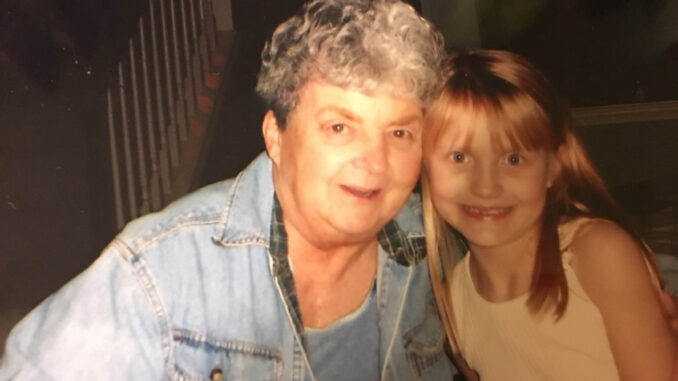
Colleen Hammond | Editor-in-Chief
Aug. 26, 2021
The unforgettable shriek of metal on metal as my mother set up the mattress in the pullout couch. The set of faded beige and green patterned sheets being pulled out of the linen closet in the hallway. My silky Disney princess nightgown. These were the hallmarks of the introduction to my love for telling stories.
Growing up, bedtime during visits to my grandmother’s house was one of the most special times of the year. She would tuck my sister and me into bed on the squeaky couch mattress that had clearly seen better days. My sister would fall asleep almost instantly.
And as my grandmother — “Nanny” as we called her — would pull the covers up under my chin, I would pose my most important request of the evening:
“Nanny, can you tell me a story?”
In the earliest years, she would look to an assortment of books and toys my mother had expertly packed for the trip as a remedy. But I was insistent.
“Nanny, tell me stories from your mouth,” I begged in my excited bedtime whisper.
Very quickly, she learned the rules of engagement. I wanted her to tell me a story she had crafted of her own vivid imagination. And being the generous woman she was, she obliged the demands of a rather forthright four-year-old.
My grandmother told the most fantastic stories — all original concoctions — complete with plot twists, character voices and even the occasional limerick. She transported me to faraway kingdoms and lulled me to sleep in the same breath.
Among my family, we’ve come to the general consensus that Nanny was the first person to nurture my love for stories.
As I grew older, Nanny’s beloved bedtime stories turned into frequent phone calls and letters — often sent to me while I was away at summer camp — detailing her many late-age adventures.
She told me all about the chipmunks who lived under the patio that she left red grapes out for so she could watch them puff up their cheeks; how the tree I used to climb in her front yard was blooming; and (my personal favorite) how her and her best friend Bernice accidentally ordered 80 chicken nuggets in the McDonald’s drive-thru.
When my grandmother passed away just weeks before I started college, I had a very child-like fear that the story had ended. As many of us have learned over the past year and a half, death can be an unexpected period at the end of a sentence we thought was just beginning.
While it’s been over three years since her death, I still find myself looking for a card in her scrawled cursive handwriting in the mail on my birthday every year.
But that’s the power of a great storyteller.
For years, I thought she told me these stories as a form of entertainment, but in actuality, she was preparing me for the life she saw ahead of me.
For her, it was always about more than the stories: it was about the connection she made with me and the bond it forged between us.
In telling me her stories, she taught me storytelling is more than a simple relaying of events. It is about listening and being present for those who have something they need to say.
And I’d like to think it’s why I’m here now, pursuing a career in journalism.
As a reporter, it’s my job — above all else — to listen. I once heard that Mother Theresa of Calcutta used to describe herself as a “pencil in the hands of God.” I’m far from a Mother Theresa figure, but I think I’m a set of ears for the people in this community. I am one person, and I am far too small to fix all the daunting problems we face today in the world.
But I can listen.
This campus is filled to the brim with stories that reveal the intricate complexities of our community. And I am honored that I get to be the one to hear and tell those stories.
As someone who has felt voiceless before, I want The Duke to continue its tradition of giving those in our community who feel unseen and unheard the platform they need.
It is in telling our stories, honestly and truthfully, that we preserve our connection with humanity.
I realize that most of us feel we don’t have any stories to tell from our time in the pandemic. We sat at home. We attended Zoom meetings. We worked. We struggled. We slept. And we did it all again the next day. We lived in some variation of a hellish Groundhog’s Day time loop.
Now, as we enter the next phase of the pandemic time warp, we have a rare opportunity to use our collective stories as a way to heal each other from the hardships we have collectively endured since the world shut down.
The best advice I’ve ever heard about storytelling came from the great playwright, director, screenwriter and actress Phoebe Waller-Bridge.
“Write like you’re not afraid,” Waller-Bridge said at the end of her book Fleabag: The Scriptures. And I intend to do so.
So this year, please, tell me a story.


